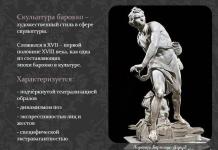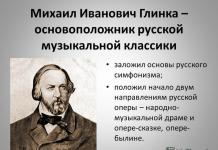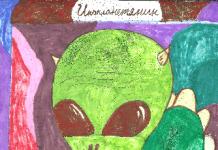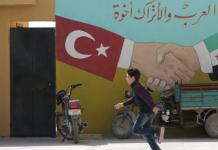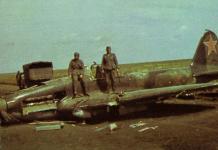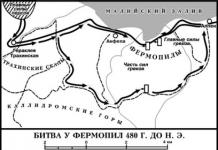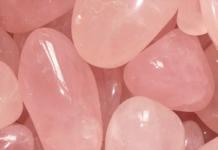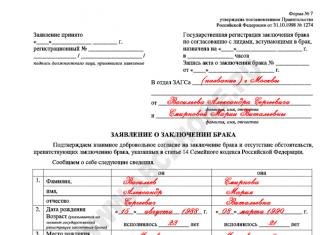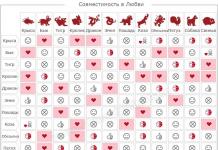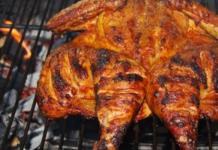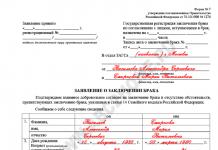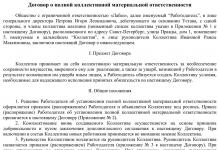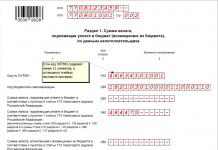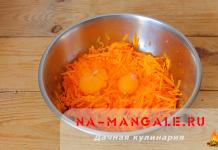It's hot spring days. The buds are already swelling on the trees. This gives a lacy whimsicality to the pattern of branches drawn against the bright background of the sky. Spring is felt in everything: in the golden glow in the air, in the delicate colors of the sunset, and in the restless chirping and chirping of birds. The first grass is emerging. It has not yet become dusty, and its fresh greenery colors the gray slabs of the pavement. Everything around is brightened by the rays of the sun, like an ugly face that becomes prettier with a joyful smile. (75 words)
Tasks
- Write transcriptions of the words in the first sentence.
- Divide the words of the penultimate sentence into syllables.
- Write down words with unpronounceable consonants, select two or three words with the same root for them. Sort out the words according to their composition.
- In the last two sentences, find words with the same root and analyze them according to their composition.
- Find nouns and third declension and write them in three columns.
- Indicate in the text all nouns in the accusative case.
- Indicate in the text all unstressed endings of nouns of the first and second declension. Explain their spelling.
- Decline two second declension nouns from the fourth sentence.
- Decline the phrase second declension noun+adjective from the fourth sentence.
- Write down three words with unstressed vowels being tested, and match them with test ones. Sort out the words according to their composition.
The gardens are awash in pink and white. It seems that there is nothing around except this incredible noise of happy spring trees of cherries and cherries, apricots and plums, apple trees and pears. And above all this, like a bride in a white haze, she proudly raises flexible bird cherry branches braided into braids. Throwing down her tear petals, she seems to cover everything around with snow. Bees, bumblebees, wasps, ants, butterflies - all living things gathered to drink the intoxicating sunny nectar, humming and fluttering their wings and paws with pleasure.
Everything is flaunted in a magnificent outfit. The flowers around are similar
Like a children's kaleidoscope: they change every minute, amusing us with the incredible richness of the palette. There is a fragrant aroma around, formed from many components.
In the evening the colors soften, the air gets a little colder, and the day calms down. But then from the hazel bush comes the familiar clicking of a nightingale. A small gray bird, full of nervous energy, flutters the tips of its wings and tail, inflates its small neck, announcing that it is already home, already on its native land. The song ended, I got lost in the darkness of the night. But, having rested just a little, this Russian virtuoso, wrapped in the twilight of the night, will again give people the eternal melody of life. Spring gives us a special time full of hope.
Dictation on a spring theme (171 words)
(No Ratings Yet)
- Every year we meet December, and it is very often unlike other winter months. It frightens you with severe frosts and makes the long December night so cold that the air burns in the morning...
- Autumn has arrived, sorceress autumn! Birds are worried, nervous, sometimes they cry out. Now the time has come for them to get ready for the long journey. And the orange autumn, decorated with many colors, is already riding on a red horse....
- The spring season is symbolized as the rebirth of nature after hibernation. Not only people, but also animals, tired of the cold winter, are waiting for spring. People often say that spring has come because...
- I live in a big City, where life is vibrant regardless of the time of year. There are always a lot of people on the streets here who are in a hurry to do business, there is a lot of transport on the roads, the streets are crowded with houses,...
- It is not without reason that poets of all times admired and sang the praises of spring nature. And it’s not even about special beauty. Nature is beautiful at any time of the year, but Spring has a different mood. A feeling of renewal, rebirth, celebration...
- The spring of 1827 found Alexander Pushkin in St. Petersburg, where the poet was able to return after southern exile and forced confinement in the Mikhailovskoye family estate. Over the long 7 years spent in exile, Pushkin...
- Where yesterday there was a road, today the raging Snowy Sea foams endlessly with its sharp edges. A playful wind pushes me on the shoulder - and, shielding my face with my hands, I involuntarily take a step, then...
- Mikhail Vasilyevich Nesterov is a Russian artist who opened a new page in the development of Russian painting. I really liked the painting “Lel. Spring". The entire canvas is occupied by nature awakening from its winter sleep. Birches with...
- Alexey Gavrilovich Venetsianov is an outstanding painter. His main works include genre scenes from peasant life. One of these works is the painting “On the arable land. Spring". The painting depicts early spring....
- Plan 1. The arrival of spring. 2. Spring in the city. 3. Nature comes to life. 4. The long-awaited time of year. Nature had not yet woken up, But through the thinning sleep, she heard Spring and involuntarily smiled at her...
- Fyodor Tyutchev is rightfully considered one of the founders of Russian romanticism. However, despite the fact that the poet lived most of his life abroad, and his idols were Friedrich Schelling and...
- The image of spring in Russian literature is closely connected with the renewal of nature and its amazing transformation. This topic worried many poets, who never ceased to be amazed at how wisely our world is structured, and...
- This painting by Levitan is one of his most famous and significant works. He depicted a river during a spring flood. The water flooded everything around, it overflowed its banks. I found myself in the water...
- This seemingly simple question has been asked by many people for many years. And there is still no clear answer to what human happiness is. Everyone is free to answer in their own way...
- The poetic images created by Boris Pasternak are very bright and varied. However, unlike many other poets, he never embellished reality. Therefore, the landscape lyrics of this author are distinguished by their realism, although in...
- A. N. Maikov and A. A. Fet can rightfully be called singers of nature. In landscape lyricism they reached brilliant artistic heights and true depth. Their poetry attracts with its visual acuity, subtlety...
- Seasons Spring. Spring has come. The drops are ringing merrily: the icicles outside the window are melting. In the thawed patch the first snowdrop is about to bloom its petals. Talkative streams ran. The sun literally blinds the eyes - such...
- Just over 16 years ago, humanity entered a new millennium. Over the centuries-old history of development, major cultural, scientific and technical achievements have been achieved. But at the same time, we face more and more...
- The famous artist Sergei Arsenievich Vinogradov is considered by many to be Levitan's heir. He connects his work with the traditions of landscape painting. His main theme of creativity is life in harmony with nature and the full...
- At the age of 15, young Lermontov fell hopelessly in love with Ekaterina Sushkova, a flighty, flirtatious and rather cruel young lady. She ignored the advances of the young poet, although she admitted that she was very flattered by him...
- I have already seen several paintings by different artists that depict the beginning of spring. I think this time of year is very inspiring for creative people. The main thing that I liked about the picture is that...
- The poem “Spring is not like joy...”, dated 1916, dates back to the early period of Yesenin’s work. It was first published in the charity collection “Gingerbread for Orphaned Children,” edited by the writer...
- The year 1917 played a key role in the life and work of Anna Akhmatova. And it was by no means a matter of revolution, which sowed chaos and destroyed the old foundations. It was this year that Akhmatova...
- A. Blok’s poem “Oh, spring without end and without edge...” was written on October 24, 1907, it is part of the cycle “The Spell of Fire and Darkness.” The poem is filled with optimism, has a symbolic meaning...
- A. A. Blok’s poem “Oh, spring without end and without edge” can be called a turning point in the poet’s worldview and work. It was written on October 24, 1907 and was included in the series...
- Since the advent of the first devices that allowed humans to carry out complex mathematical calculations, inventors have been trying to create a universal machine. In the sixties of the last century, such a device was called a computer. Already today it is...
- Every day, wake up to the singing of a nightingale, admire the charming nature, golden crosses on churches, wonderful playgrounds where kids frolic happily. And so the boys ran with toy pistols and...
- Modern, current, real - all these words in a certain context can mean “that which currently exists.” Eras change, years pass. It seems that time will never stop. At twenty...
- Choosing a future profession is one of the most important decisions in the life of every teenager, because the future of life and, of course, its quality and level will depend on it. That's why I need...
- Nothing enlivens and decorates a room like houseplants. Discs, books, posters - all this seems dead in comparison with the greenish tall leaves in porcelain flowerpots, which are ideal...
Federal Agency for Education
State educational institution
higher professional education
NIZHNY NOVGOROD STATE
LINGUISTIC UNIVERSITY
THEM. ON THE. DOBROLUBOVA
M.A.Grachev
WRITE CORRECTLY
Russian language workshop
PartII
Nizhny Novgorod
Published by decision of the editorial and publishing council of the State Educational Institution of Higher Professional Education NSLU
UDC 811.161.135 (075.8)
BBK 81.411.2-932.81
Write correctly: Workshop on the Russian language. Part II- Rev. and additional Nizhny Novgorod: NGLU named after N.A. Dobrolyubova, 2008.
The second part of the collection “Write competently” provides the keys to exercises and dictations on spelling and punctuation (Part I).
The manual “Write Correctly” is intended for evening and correspondence students of the NSLU named after. ON THE. Dobrolyubova.
Compiled by: Doctor of Philology,
Professor M.A. Grachev
Reviewers: Doctor of Philology
Professor T.V. Romanova
Candidate of Philology
Associate Professor E.I. Efremova
@ Publishing house GOU VPO NGLU, 2008
@ Grachev M.A., 2008
CHECK YOURSELFExercise on tested vowels. Fill in the missing letters and subscripts
Write test words.
The flag flutters (flies), scorch (singe) the goose, beg (begs) for mercy, become very emaciated (skinny), quickly turn gray (grey), harbor (secret) a grudge, guard (watchman) the warehouse, consolidate (firmly) success, wide valley (valley), irritated (teases) man, wriggling (wind) ribbon, the earth is exposed (naked), the flower is fading (withered), creep (crawl) through the grass, enchanted (enchanted) forest, stunning (shaking) picture, unite ( united) efforts, frolic (playful) on the street, publish (publish) a book, sing (sing) a song, put on (put on) a fur coat, chop (split) firewood, reconcile (peace) enemies, develop (develop) speed, rinse (rinses) ) linen, see (sight) of a friend, sit (sitting) on a bench, remain silent (silently) for a long time, return (return) with success, enjoy (sweet) contemplation of nature, grab (grab) a briefcase, wave (wave) a hand, tens ( ten) people. Exercise on spelling roots KAS-KOS, PLOV-PLAV, MAK-MOK, LODZH-LOZH,SKAK-SCOCH, STEEL-STEL, MER-MIR, BER-BIR
. Insert the missing letters.
Swimmer, quicksand beetles, dip, waterproof, believe, put, tangent, touch, slip through, collect, collect, spread, spread, shine, shine, freeze, freeze, grind, grind, choose, choose. PRE And AT
dowry, drive, overcome, adherent, extol, transform, surpass, betray a friend, oath, increase, president, seduce, wrangle, time, accession, oppression, reconciliation, elderly, stop, wisdom, endure, hinder, advance, privilege, satiate , full, adventure, ghost, joke, refuge, abide, overcome, follower, privilege, freedom, primitive, force, exceed, tradition, presidium, oath, acquire, neglect, prevail, overcome, teach, convey, embellish, reconciliation, adapt . , roadside, arrive, force, refract, overcome, join, argue, interesting, transform.
Spelling exercise on I/S after the prefix
Find, summarize, counterplay, disinfection, childhood, play, find, hopeless, nameless, medical institute, uninitiative, sports equipment, search, raise, background, super-refined, improvise, super-inert, find, disinformation, inter-institutional,
Spelling exercise Kommersant PRE b. Insert a soft or hard sign where necessary.
Rye, window sill, dacha, conflagration, volumetric, pears, away, afraid, trilingual, thousand, trouble-free, steep, traveling, unification, trembling, bitterness, losing, fighting, mighty, creaky, married, unmistakable, three-act, gun, immense, passerine, clerk, sarcastic, supernatural, look, only, monsters, schools, children, doctor, daughter, rook, entirely, good, detour, flaw, lie, quiet, opportunism, cheat, inter-tier, enrage, counterattack, destroy, play naughty, gallop, rider, adjutant, present, pre-examination, hunting game, eat, landscape, postman, early morning, drive around, weeds, embrace, cloudless, roofs, smear, already, quiet, sword, hut, stove, hot, knowledgeable, appoint, cut , eat, power, good, eat, cut your hair, carry, unbearable, fight, only, daughter, meetings, tasks, alkali, burn, gallop, delay, backhand, dense, ruff, wide open, cut, rope, take it, manual work, brooch, away, backhand, angry, scare, take care, wash.
Spelling exercise ABOUT , Yo after the hissing and C. Insert the missing letters.
Stiffness, string, demarcation, hot, bakes, armed, prince, juggler, driver, chauvinism, evening (evening newspaper), chocolate, whisper, hairstyle, highway, gluttonous, gooseberry, alien, canvas, cheap, little hare, burns, little camel, liver, ramrod, canoe, locust, prude, hacksaw, fresh, purse, burn (face), burn (hand), seam, hard, slum, ridiculous, pounding, ladle, reed, suitor, uprooting forest, millstone, click, dandy , snake, stranger, good, scientist, strap, seam, hard, whisper, rustle, liver, clink glasses, princes, shoulder, well done, dance, shorts, girl, devil, driver, demarcation, armed, harnessed, hood, callous, brick , Pugachev, Pechorin, ramrod, slum, thicket, bees, barrel, doctor, hot, shoulder, glutton, jockey, highway, yellow, stove, flowing, cutting, brick, hook, little bunny, river, cheap, penny, ridiculous, prince , ratchet, smoked, simplicity, uprooting, jockey, stewed, brocade, chauvinism, lattice.
Spelling exercise N PRE NN. Remove the extra letter where necessary N.
An educated man, a confidant, a sworn brother, an oil-painted floor, a desperate boy, an uninvited guest, a written beauty, a swan song, a confused trail, an envoy, a pupil, a drowned man, boiled milk, a stationmaster, straw hair, paper pasted with a skillful hand, shorn under boxing hair, a wounded warrior, distilled water, whitewashed houses, an unfortunate martyr, a wicker picket fence, a deserted place, lined paper, burnt coal, an undaunted girl, a broken penny, an unprecedented storm, a confused look, an unexpected guest, a spoiled child, a sacred relic, a confidant face, patent leather boots, chopped stick, special expression, shorn head, art gallery, pigeon cooing, foggy morning, horse mane, true incident, leather belt, gifted
a handkerchief, a smart boy, an enthusiastic man, a polished table, a box loaded with parts, a drawn triangle, a painted table, a stamp pasted over yesterday, a dethroned king, an absent-minded young man, an unsolved problem, houses not illuminated, a lion's roar, wooden shutters, a wounded soldier, a wounded warrior , an officer wounded in the leg, unpainted floors, a undermined bridge, a woven pattern, quicklime, uprooted timber, a silver jug, a tin soldier, an unextinguished fire, long uncut hair, a windless day, patent leather boots, a gilded ticket, a dinner boiled in a pan, gilded ball, untrodden path, unexpected guests, harnessed horse, beef stew, mad haste, furious people, wrought iron, dropped rein, ball thrown over the net, hewn post, knitted jacket, antiques, polka-cut hair, calm weather, windy day .
Exercise on continuous and separate writing NOT .
Having not given a word, be strong, but having given it, hold on (last). The old man complained of being unwell. He was an extremely ungrateful man. Still, he didn’t do it my way. The student studies no worse than others. The boy was reluctant to sit through his lessons. The peasant worked with no less diligence. The students were very unprepared. It is not profitable for anyone to sell this product. The girl picked an unblown flower. There was an unsent letter in his desk. This is by no means an accidental mistake. The girl had an almost invisible mole on her hand. The solution is far from clear. This pain is unbearable. A persistent wind was blowing. He could neither write nor read. The bus is neither fast nor slow. The man did not speak Russian. I have no one to go to the cinema with. The old man disliked the boy. The student is not capable of music. The owner was not happy with the guests. The enemy was in no worse conditions. This is not how this problem should have been solved. Such a ridiculous death! He was also in no worse conditions. I have no one to blame - it’s my own fault (L.N.T). This task is not difficult, but easy. This was a man who was not prone to colds. Everyone condemned him for his extremely rash decision. This was far from the only incident in the old man’s life. At the same time, an in no way justified act was committed. It was not beneficial for anyone to shoot birds. Only one strip is not compressed. (Necr.)
The unsent letter lay under a stack of books. The unopened flower died from frost. The carpenters' work is not finished. Something solemn and enchanting is written across the dark sky with a golden pattern of stars. Despite my dislike for Arkady Pavlovich, I once had to spend the night with him (Turg.). If I meet an enemy, I engage him in battle, regardless of his superiority. This was, of course, not without reason. This is by no means the only solution to the matter. The museum displayed the skeleton of a species of animal that had never been found anywhere. The question was asked in a highly incorrect manner.
An exercise on continuous, hyphenated and separate writing of adverbs.
To speak German, without looking back, without enlightenment, in my opinion, barely, little by little, as quickly as possible, from somewhere, firstly, once upon a time, apparently, like bears, in their heads, the other day, in the hearts, in sight, on the fly, hard-boiled, point-blank, under the armpits, by eye, barely, here and there, completely, until now, empty, in vain, three times, to the left, into the foggy distance, look into the distance, half-heartedly, love forever, forever, openly, as before, below, up, by eye, to the right, for a long time, inhaling, unexpectedly, at the very least, to the extreme, tirelessly, in German, crosswise, without looking back, mockingly, barely, deep, in large quantities, in plenty, familiar, down, from the inside, to the full, firmly, once, out of nowhere, to death, eccentric-eccentric, face to face, long ago, red-hot, blind , from a young age, restrainedly, twice, three times, for two, up, to the top, half-heartedly, out of nowhere, firstly, barely, exactly, in Russian, hard-boiled.
Exercise on spelling prepositions and prepositional combinations. Write together or separately, select the desired letter at the end.
Due to drought, the wheat did not grow. In conclusion, the lecturer drew attention to the dangerous military situation in the region.
Changes were observed in the flow of the river. Due to the difficult situation, many volunteers went to the front. Throughout the entire winter season, there were interruptions in the heating of residential buildings. It rained for a week. Subsequently, the boy learned a lot about this hero. I run through the bushes and, despite the fact that I am showered with raindrops, I tear the wet branches of the blossoming bird cherry (L.N.T.). A mistake was made in the investigation into Ivanov’s case. He always spoke only the truth, regardless of personalities. Due to rainy weather, communication with the village was disrupted. During the investigation, there were many witnesses in the gang case. Due to a broken power line, there was no light throughout the city. There were ripples in the river's flow.
During the night preceding the fight, I did not sleep for a minute (Lerm.). The money arrived in the bank account. Leaning against the trunk of a pine tree, not sparing shag, during the war, Terkin (Tvard.) had a conversation about the war. In the continuation of this novel we learn about the fate of the hero. For a long time he courted this girl. Some changes were observed in the flow of the stream.
It was a bird, like an owl. However, due to lack of time, we will not deviate from the subject of the lecture.
He spent four years in prison, until he was granted amnesty.
Exercise on continuous, hyphenated or separate spelling of particles.
Machine counting station, highly paid worker, Old High German language, northwestern region, commercial and industrial capital, Russian-French dictionary, tannery and shoe factory, mass political event, colorless pale crowd, dull gray appearance, dull green color, black -brown fox, cereals and legumes, drilling and cutting machine, fruit and berry crops, North-West region of Pakistan, bourgeois-provincial play, manly-stern appearance, ugly-pathetic pose, light yellow tablecloth, satin-green carpet, blue-eyed boy, seventy-five-year-old man, car repair plant, little-used medicine, nearby island, burning question, deeply respected person, clairvoyant prophet, potent poison, evergreen plant, painkiller, just the opposite, fleeting time, Faculty of Physics and Mathematics, northeast direction, machine -tractor station, bluish-gray color.
Exercise on spelling prefixes NOT PRE NI.
There are whole periods of life that you don’t want to remember. And not because any of our mistakes, misfortunes or failures are associated with them. In failure, as my father told me, there are also good sides... No, it’s not because of these reasons that I sometimes don’t want to return my memory to the past. There is no desire to remember some years because they added nothing to the idea of real life that each of us has.
At first, I earned very little money from ROSTA. I still lived in Pushkin and could not arrange my life more or less tolerably. Every month, about ten days before payday, I ran out of money. There was still enough for food, but there was nothing left for cigarettes.
Asking for cigarettes from friends and acquaintances was awkward and ultimately impossible. This activity also had its limits. Then, quite unexpectedly, I discovered a simple and free way to obtain tobacco. I went out in Pushkin to the Northern Railway and walked along the tracks, picking up all the cigarette butts. On the way from Pushkin to Klyazma, in just three kilometers, I usually collected up to two hundred cigarette butts. Gradually, I accumulated valuable observations on both cigarette butts and smokers.
I despised some smokers, but for others, albeit a few, I felt sympathy and gratitude. I disliked those who smoked cigarettes until they reached the cardboard mouthpiece. Obviously, these were prudent and stingy people. I approved of nervous and capricious smokers. They never finished smoking cigarettes, and often threw them away after one or two puffs.
(K. Paustovsky, 249 words)
Exercise on punctuation marks with isolated definitions.
When he, heavy and majestic, with a stern expression on his face in his snow-white tunic, walked along the boulevard, then at that time he really liked himself (Czech). And smoke rose, warm and bitter at home (Surk.). The wind, strong and gusty, was now blowing in the other direction. Tired of the long trek, the hunters quickly fell asleep. The air, frosty and thin, stung like needles in my nose. Tolstoy is a hero, a hero who accomplished a titanic deed, rose above his era, and united in himself the best national traits of a Russian person (Likh.). It was a girl of small stature, slender, almost thin, with a pale face and large brown, always half-closed eyes (Turg.). On thoughts breathing with power, like pearls, words descend (Lerm.). Having grown up in poverty and hunger, Pavel was hostile to those who were, in his understanding, rich (N. Ostrovsk.). And we will visit the empty fields, the forests that were recently so dense, and the shore, dear to me (Pushk.). Between the clouds and the sea, the Petrel soars proudly, like black lightning (Gorky). The sea at his feet lay silent and white from the cloudy sky (Paust.). Instead of a cheerful life in St. Petersburg, boredom awaited me in a deaf and distant side (Pushk.). A recently arrived accountant (Shol.) was rummaging through books at the table. Marya Dmitrievna assumed a dignified and somewhat offended look (Turg.) Attempts to translate led me to sad and unpredictable results. And he, rebellious, seeks storms, as if there is peace in storms (Lerm.). Energetic, tall and mocking, he stands and waits for someone.
Gavrik examined the little high school student in a long overcoat down to his toes from all sides (Cat.). The sky opened up, transparent, icy and blue (Fad.). The mother, sad and anxious, sat on a thick bundle and cried (Fad.). The atmosphere in the forest was suffocating and unbearable. Reflected by the sea, these stars jumped on the waves and sparkled. Accompanied by an officer, the commandant entered the house (Pushk.). People, amazed, stood like stones (Gork).
We flew headlong through the thicket. Clinging to the reins with their sabers, rattling their spurs and hurrying, the hussars dismounted, not knowing what they would do (L.N.T.). And then, suddenly enraged, he rushes through the whole house, furiously shaking all the shutters and doors, or, climbing into the chimney, whines so pitifully, boringly and continuously, then raising his voice ever higher, ever thinner to a plaintive squeal, then lowering it to an animal one. growls (Cupr.). Life is arranged so devilishly that, without knowing how to hate, it is impossible to sincerely love (Paust.). Makar sat swaying slightly and continued his song (Cor.). Remembering the theorem, the boy quickly solved the problem. Rolling up his sleeves, the father got to work. Grumbling and looking around, Kashtanka entered the room (Czech). The fogs, swirling and twisting, slid down to the foot of the mountains.
The tram flew, ringing, towards the sea itself (A.N.T.). Large drops of rain crashed onto the ground, turning into dust and tiny splashes (Sol.). The wind, still strong, now blew from the east, scattering snow and rain clouds. He worked carelessly. The mother ran without looking back and sobbed as she ran (Glad.). The foliage of the birch trees hangs motionless (Paust.)
The old man sat hunched over. Now touching the wing of a wave, now soaring up to the clouds like an arrow, he screams (Gorky). Tired, thirsty, wiping blood and sweat from his face, Harun recognizes his native village between the rocks in the moonlight (Lerm.). The young man got down from the windowsill and walked around the room, waving his arms. Having drunk tea and admired the mountains, the morning and Maryanka from his porch, he put on a tattered zipun and went to the forest at about six in the morning (L.N.T.). Running to his room, he began slamming the drawers of the table (A.N.T.). Shouting to the dog, the hunter quickly walked towards the clearing. The eyes, languidly moistening, looked at him with an unblinking gaze. Here, between two sown fields, crossing a hillock, there remained a narrow strip of once plowed, but then abandoned land (Skald.). The Cossacks crawled away, looking for cover, choosing a more comfortable place (Shol.).
Exercise. for special circumstances. Explain punctuation marks.
At night, throughout the village there was such a smell of warm bread, with a golden brown crust, with cabbage leaves burnt to the bottom, that even the foxes crawled out of their holes, sat in the snow, trembled and quietly whined, wondering how they could contrive to steal at least a piece of this wonderful bread from people. Along the edges of the road, behind the spreading willows, the rye was agitated and the quails were quietly chattering; the stars glowed in the blue sky. The evenly-trodden road, softly turning gray in the ant, ran into the distance. To the right, above the light sea of rye, darkened the centuries-old garden of the master's estate. In the grass, behind the linden trunks, a vague rustling and movement could be heard. It was beginning to get lighter in the east, but the stars above the willows of the dam still sparkled; Below, under the mountain, steam flowed along the wide surface of the pond; the open door of the bathhouse creaked strangely in the silence. I slowly moved forward, stepping carefully on the grass so as not to crunch a twig. Five minutes passed, ten, and I stood motionless and listened eagerly.
Exercise on punctuation marks for generalizing words and homogeneous parts of a sentence.
Forests, fields, and meadows - in a word, everything around turned white. One day Swan, Cancer and Pike began to carry a cart with luggage (Wing). Drinking tea at the table: the cook Smury, his assistant Yakov Ivanovich, the kitchen utensil Maxim and the waiter for deck passengers Sergei, a hunchback with a high-cheekbone face (Gorky). How could he know that my grandmother was both father and mother for me - everything that is dear to me in this world. Half-asleep, Nikolai Rebrov ate and drank greedily: bread, milk, pickled sour cucumbers, potatoes (Shishk.). And the ruffe, or perch, or roach look at the fisherman from under the water (A.N.T.). All feigned gaiety, self-control, restraint - everything left him at that moment (Shol.). Broken barrels, wood chips and straw sway around the boat, sometimes a pole or log floats like a dead snake (Gorky). Her face, her figure, gait, gestures, facial expressions, the sweep of her eyebrows - all this, reunited in parts, made up her tender, lively personality (Shol.). Harvested rye, weeds, wild hemp - everything, browned from the heat, red and half-dead, now washed with dew and caressed by the sun, came to life to bloom again (Czech). The detachment acquired a lot of camping equipment, such as: boilers, kettles, axes, cross-cut saw (Ars.). Dogs, horses, chickens - everything was wet, dull, damp. All this: the huge and lush top of the maple, the light green ridge of alleys, the wedding whiteness of apple, pear, bird cherry trees, the sun, the blue of the sky - everything amazed with its density, freshness and novelty (Bun.). Among the birds, insects, in the dry grass - in a word, everywhere, even in the air, the approach of autumn was felt. Children: Natasha, Volodya, Yulia Kostya - all go to school. Everywhere, above and below, larks sang. Forests, meadows, swamps - in a word, everything around came to life. And under the Balkan stars they remembered for a reason Yaroslavl, Bryansk, and Smolensk places (Isak.).
The bear got into the hut, began to look for the old man and the old woman, and ended up underground (A.N.T.). They ask to go to heaven, but they are afraid of death. Swamps and swamps, the blue plateau of heaven, the forest rings with gilded pine (Yesen.). I’ll come to you in the spring or go to the Caucasus (Bat.). At first glance, he is good and green (Wing). It was light, but dull and gray like autumn (Gork...).
Exercise on punctuation marks for introductory words and sentences
That summer the crucian carp, as they say, was a fool: perhaps it sensed that the ponds would soon be drained and it would be an honor to die anyway. Bats flashed around me with a barely audible ringing, and it seemed as if weakly stretched strings were ringing in the air. Suddenly, somewhere, I didn’t have time to figure out where, something crackled dully and then gave a heavy, reverberating gasp; I felt that the boat and I were being pulled somewhere. Really, procurator, you don’t owe me anything (Bulg.). In all likelihood, it will be very difficult for him. My embarrassment, however, immediately dissipated by itself, and I went downstairs in the same bright, unaccountably joyful mood. Dad made a move; he seemed to want to hug me; he seemed to be waiting for me to express remorse. If dad hadn’t had to leave soon, everything might have gone back to normal; but after a few days he left for a long time. On Katya’s beautiful, always calm face I read such merciless condemnation of myself that it seemed that if I had died, her face would not have flinched. (L.N.T). You, of course, noticed that all the fairy tales are very long, but it could not be otherwise. You know, we all have such a fate and, perhaps, ask everyone: rejoicing, raging and suffering, life is good in Russia (Yesen.). Such a scout, of course, will be respected. True, he is apparently a strong-willed person. So, apparently, this was the case. By the way, having returned to his place, Prokhor Petrovich completely approved all the resolutions (Bulg.). For example, do you see this piece of land? (Bulg.). Maybe he's finally dreaming now. He must have dreamed of Metropolitan Bilogue (Ilf and Peter). However, he himself was of the same opinion. Such a conversation may never have happened. Of course, there could be no talk of any privileges. In essence, I had no sins.
People have always thought about how a person can find himself. But whether a person found himself or not, before, generally speaking, few people were interested. Today, the problem of finding a place in life, of course, cannot but worry society.
Some laboratories in our country are conducting research on vocational guidance. But, of course, one cannot rely only on these studies, especially since they, unfortunately, are still far from completed. Even if a system of moral assistance is created, the same as, say, medical assistance, even then it will only be able to guarantee against gross mistakes and treat, so to speak, mild forms of the disease. In all other cases, a person, as they say, remains alone with himself. And here it is important to make it clear to him that without the most active participation of everyone personally, the problem of finding a place in life, of course, cannot be solved. You need to look for your place, your work. Then, undoubtedly, it will bring deep satisfaction.
(From newspapers)
Dictations spring
On some birch trees facing the sun, earrings appeared, golden, wonderful, not made by hands. On others, buds just appeared, on others, little green birds opened up and settled down, as if surprised by everything in the world. And all of this for us, people, is not just a bud, but a moment: if we miss it, it won’t come back. And only out of many many, one lucky person standing in line will become bolder, reach out his hand and manage to grab it.
Lemongrass, a yellow butterfly, sits on a lingonberry, folding its wings into one leaf: until the sun warms it, it will not fly and cannot fly, and does not even want to escape from my outstretched fingers towards it. A black butterfly with a thin white border, a nun, froze in the cold dew and, without waiting for the morning rays, for some reason fell down like an iron...
Has anyone seen how ice dies in a meadow in the rays of the sun? Yesterday it was still a rich stream: you can see it from the garbage it left in the meadow. The night was warm, and during the night he managed to carry away all his water and connect it to the big water. The last remains were caught by frost in the morning and turned into lace in the meadow. Soon the sun tore all these laces, and each piece of ice died separately, falling to the ground in golden drops.
Yesterday the bird cherry blossomed, and the whole city was dragging branches with white flowers from the forest. I know one tree in the forest: for how many years it has been fighting for its life, trying to grow higher, to escape from the hands of those who break it. And we succeeded - now the bird cherry tree is all bare, so it’s impossible to climb. The other one couldn’t cope, became sick, and now only sticks stick out from her.
(M. Prishvin, 240 words)
HARE CABBAGE
We are all a little poets at heart, especially hunters. It used to be that we entered the forest together with the dog. In one dewy clearing, the dog sensed a trail, looked at me, and I understood her: they spent the night nearby and went out into the field through these clearings of black grouse. But just when the dog sensed the trail and led the way, suddenly a ray of sunlight broke through the thick crown and fell precisely on that leaf of hare cabbage, from which the dog smelled of a grouse feather. Caressed by the sun's ray, the hare cabbage leaf immediately folded, like an umbrella folds when the rain stops. The dog stopped, and while she stood, the man saw how a ray of sunshine caressed the entire clearing and all the forest hare cabbage throughout the clearing formed into umbrellas.
So for the first time in my life I saw how the hare’s cabbage folds into umbrellas from the sun’s ray, and the most important thing is that after that everything in the forest began to appear to me in ways that I had never seen before. And that’s why everything around us became magical: we are all a little poets at heart, especially hunters. Of course, in every botanical book you can find that a shade-loving plant hides from the sun and that hare cabbage, like a shade-loving plant, should also curl up. But in the botanical book it is said in general about shade-loving plants, and even if about hare cabbage, then, of course, also in general, and not about that very leaf from which the dog smelled of black grouse, and at the very moment when it came out through the branches of dense fir trees a ray of sunshine hits him.
(M. Prishvin, 241 words)
WALK THROUGH THE FOREST
Behind the station the bright evening sun hit my eyes, but beyond that there was a shady forest. And we walked for a long time through its cool clearing, along roots and trampled, elastic paths, near a dirt road, among aspens and dense hazel trees, touching us with velvety foliage. One could see drops rushing like long needles from the cheerful blue sky, from a high smoky cloud. Then they flashed less frequently, the rainbow on the hill began to fade - and the rustling immediately died away. It was northern twilight in the forest. And the forest, silent, dark, stretched for many miles around. And this entire forest region was now immersed in a sad and calm anticipation of the night. The shallow swampy lake along the shore of which we made our way was still white among the trees. But it was also dim and sad, like in a forest. Clouds moved in, merging with the darkness of the forest. And the warm sunny air, filled with the spicy aroma of marsh herbs and pine needles, became numb. Fireflies smoldered like golden emeralds under the bushes, dozing to the mysterious whisper of grasshoppers. To shorten the path, we turned from the lake into a long and wide corridor of centuries-old pine trees. And already with difficulty distinguishing the road, we walked along the deep sand to the clearing, when suddenly something rustled in the dry tangled needles and a large big-headed owl emerged from there. She silently described an arc, fell down again and smoothly sank in the thicket of branches, in the darkness.
We walked across the clearing towards the green light of the semaphore, flickering behind the trees. It got completely dark; The rain whispered quietly with the forest. And when we ran onto the balcony of the dacha, under the canvas canopy, to the tea table, lit by candles in caps, the rain was already pouring down in buckets. We shook ourselves off and pretended to tell how we got lost and how we were looking for the way.
(I. Bunin, 256 words)
FOREST CREEK
If you want to understand the soul of the forest, find a forest stream and walk up or down its bank. I walk along the bank of my favorite stream in early spring. And this is what I see, and hear, and think here. I see how, in a shallow place, flowing water meets a barrier in the roots of spruce trees, and this makes it gurgle against the roots and release bubbles. When these bubbles are born, they rush quickly and immediately burst.
The water encounters new and new obstacles, and this does nothing for it, it only gathers into streams, as if it were squeezing its muscles in an inevitable struggle. The ripples on the water, captured by the sun, and the shadow, like smoke, forever runs across the trees and grasses, and to the sounds of the stream, resinous buds open, and the grasses rise from under the water and on the banks.
Let there be a blockage on the way, let it! Obstacles make life! Obstacles make life: without them, the water would immediately go lifeless into the ocean. A wide depression appeared on the way. The stream, sparing no water, filled it and ran on, leaving this creek to live its own life. The entire passage of the stream through the forest is a path of long struggle, and this is how time is created here. And so the struggle continues, and in this duration life manages to arise. In its struggle, the stream has efforts, the streams, like muscles, twist, but there is no doubt that sooner or later it will end up in the ocean to free water. The stream has tied me to itself, and I can’t step aside, it’s getting boring. I sit down on the roots and, while resting, I hear the confident streams calling to each other down there, under the steep slope.
(M. Prishvin, 245 words)
The morning when this story begins is cloudy but warm. The vast meadows were watered by the night rain, which meant that not only a drop of water glistened in each corolla, but the entire great variety of herbs and bushes emitted a sharp and refreshing smell.
I walked through the meadows to one rather mysterious lake. In the eyes of a sober person, there was and could not be anything mysterious in this lake. But the impression of mystery from this lake remained with everyone, and no matter how hard I tried, I could not establish the cause of this phenomenon. For me, the mystery was that the water in the lake was completely transparent, but the color seemed like liquid tar. In this watery blackness lived, according to the stories of talkative collective farmers, crucian carp of enormous size. No one had ever caught even one such crucian carp, but occasionally, in the depths of the lake, a bronze reflection suddenly flashed and, wagging its tail, disappeared. The feeling of mystery arises from the expectation of the unknown and not quite ordinary. And the density and height of the thickets around the lake made us think that they would certainly hide something hitherto unseen or deadly curious: either a dragonfly with red wings, or a blue ladybug with white speckles, or a poisonous flower with a hollow, succulent trunk.
And all this really happened, including huge irises with sword-shaped leaves. They were reflected in the water, and for some reason there were always crowds of silver fry around this reflection, as if pins attracted by a magnet. On the lake, deeply hidden in the steep banks, lay a muddy shadow, and in this shadow the silver willows themselves turned silver from the dew.
(K. Paustovsky, 244 words)
The swan, due to its size, strength, beauty and majestic posture, has long been rightly called the king of all waterfowl. White as snow, with shining transparent eyes, with a black nose and black paws, with a long, flexible and beautiful neck, he is inexpressibly beautiful when he calmly swims between green stones on the dark blue smooth surface of the water.
Swans almost always arrive in pairs; appear quite early in the spring, at the beginning of April, when for the most part it is still covered with snow. I have not seen flocks of swans: in those places of the Orenburg province where I constantly hunted, swans are only in flight, but do not live permanently and do not raise children, and for me their appearance not during flight was a rarity. Is it possible that sometimes several single swans, wandering around large ponds and lakes, will like some free place in my neighborhood, and if they are not frightened, they will stay there for two weeks or more.
I remember in my youth a strange incident when swans flew to our large pond. This went on for about two weeks. Finally, one old hunter, having loaded his crappy gun with pieces of a chopped iron rod, climbed into the reeds before the swans arrived. He, standing waist-deep in the water, waited until they swam a few meters towards him, shot and killed one swan on the spot. Of course, the rest immediately flew away, but the next day they flew back again, sat down in the middle of the pond, swam without approaching the dangerous reeds, cackled among themselves, gathered in a group, got up, flew away and did not return.
Swans are easily made tame. I myself saw them for several years, living the summer on a designated pond and spending the winter in a warm hut.
(S. Aksakov, 253 words)
The shutters were closed, but my room was next to the living room, and through the open door I saw half-light in the hall, and the nightingales could be heard throughout the house. Having let my hair down, I sat on the bed for a long time, still trying to decide something, then I closed my eyes. Something timidly cracked in the hall. I became alert and opened my eyes. The hall became darker - everything around me and in me had already changed and lived its own life. The nightingales fell silent, the pendulum in the hall ticked carefully and measuredly, and the silence in the house became tense. Listening to every rustle, I sat up in bed and felt completely in the power of this mysterious hour.
I put on my shoes, threw a shawl over my shoulders and, carefully going out into the living room, stopped at the door to the balcony with a beating heart. Then, making sure that not a sound was heard in the house except the measured ticking of the clock and the nightingale’s echo, she silently turned the key in the lock. And immediately the nightingale’s clicking, echoing through the garden, became more audible, the tense silence disappeared, and the chest sighed freely with the fragrant dampness of the night.
It was fresh, I wrapped myself in a shawl, and in the brightening expanse of the sky, which seemed to grow larger and deeper to the eye, a small star trembled like a clean, bright drop. I loved someone; and my love was in everything: in the cold and in the aroma of the morning, in the freshness of the green tree, in this morning star.
(I. Bunin, 250 words)
The fog turned pink, melted in the sky, something joyful and tender was visible in the smoke of the clouds... A light azure dome shone over the mountain desert that surrounded me. But the jagged cliffs smoked under the rapids for a long time, until the sun finally shone. And then there was no trace left of the fog. The sky opened up over the mountains in all its immensity, and the undulating plateau became green in the clear air far away. The wind was blowing from the north, but it was gentle and gentle. And, intoxicated by this wind, I went to the cliffs to look at the sea again.
An endless, pitted plain of thickened clouds - a whole country of white, loose hills - unfolded before my eyes. Instead of bottomless rapids and rocks, instead of bays, this plain stretched before me to the very horizon, hanging in an immense layer above the sea. And all the strength of my soul, all the sadness and joy - sadness for the other one whom I loved then, and the unaccountable joy of spring, youth - everything went to where, on the very horizon, beyond the southern edge of the cloud layer, the sea shone with a long bright ribbon .
The bell, with a monotonous road tune, spoke of a long journey, that the past had become obsolete, that a new life lay ahead. For a long time I turned around and looked at the gray jagged rocks visible in the blue
empty sky... And the troika, under the pouring ringing and stomping, rolled and rolled lower and lower, deeper and deeper, into wooded picturesque abysses, further and further from the pass, growing and floating into the sky.
Here, in these silent mountain valleys, there was the transparent silence of the first spring days, the beauty
pale clear azure, black bare trees, last year's brown leaves packed in the bushes, the first violets, wild tulips. Here the mountain slopes were just beginning to turn green, taking a break from the cold and snow.
(I. Bunin, 258 words)
For several days the cold rain poured incessantly. A wet wind rustled in the garden. At four o'clock in the afternoon we were already lighting kerosene lamps, and it involuntarily seemed that summer was over forever and the earth was moving further and further into uncomfortable darkness and cold. It was the end of November - the saddest time in the village. The cat slept all day, curled up on an old chair and shuddered in his sleep as dark rainwater gushed through the window.
One night I woke up with a terrible feeling. It seemed to me that I had gone deaf in my sleep. I lay with my eyes closed, listened for a long time and finally realized that I was not deaf; but there was simply an extraordinary silence outside the walls of the house. The rain died, the noisy, restless garden died. White and even light filled the room. I got up and went to the window: behind the glass everything was snowy and silent. In the foggy sky, a lonely moon stood at a dizzying height, and a yellowish circle shimmered around it.
It was difficult to stay at home on the first winter day. We went to the forest lakes. A glass strip of ice has grown along the coast. The ice was so thin that even up close it was difficult to see. I saw a school of fish in the water near the shore and threw a small stone at them. The stone fell on the ice, the fish, flashing their scales, darted into the depths, leaving a white grainy trace of the impact on the ice.
The forests became increasingly gloomy, quieter, and finally thick snow began to fall. Winter began to dominate the earth, but we knew that under the loose snow, if you rake it with your hands, you can still find fresh forest flowers, we knew that the fire would always crackle in the stoves, and winter seemed to us as beautiful as summer.
(K. Paustovsky, 258 words)
STEPPE FIRES
Early in the spring, as soon as the snow melts and last year's grass begins to dry out, steppe fires begin. This habit of burning out last year's dry grass so that new grass can grow does not come without bad consequences. The earlier steppe fires start, the less dangerous they are, because the edges of the forests are still damp, there are puddles in low-lying areas, and there are drifts of snow in the forests. If everywhere is dry, then steppe fires sometimes cause disastrous devastation: the fire, fanned and driven by the wind, runs with incredible speed, destroying everything in its path that can burn.
To prevent such a disaster, about forty or fifty years ago there was one remedy in general use: to first burn the haystacks, forest, threshing floor and village around. I saw with my own eyes how whole crowds of peasants and peasant women, with brooms in their hands, carried out such scorching; they walked on both sides of the fire that was deliberately started and running like a stream, extinguished its side spills and gave it the proper direction.
With strong winds, which usually occur in the spring and aggravated by fires, especially if the grass is dry, this protective scorching is quite difficult. It happened that they could not control the fire, and it went into the field, so that the very precaution produced the same disaster from which they were protecting themselves. In the same way, deposits overgrown with tall grass and last year's stubble are burned.
Without discussing the unreasonableness of the reasons for which dry grass and stubble are burned, I will only say that fires on a dark night present a magnificent picture: in different places, either walls, or rivers, or streams of fire climb steep mountains, descend into valleys and spill over into the sea across smooth plains.
(S. Aksakov, 248 words)
BUSINESS MAN SMILE
The ancient Chinese were people wise from life experience. They had a proverb, the text of which read: “A man without a smile on his face should not open a store.” A smile says: “I like you. I'm glad to see you.” According to the head of the hiring department of a large department store, he would rather hire a saleswoman who had not completed primary school but had a charming smile than a doctor of philosophy with a lean face .
You have to experience joy in interacting with people if you want people to experience joy in communicating with you. I asked thousands of business people to smile at someone all the time for a whole week, and then report the results in class. And here is a letter from a member of the unofficial stock exchange: “I have been married for more than 18 years,” he writes, “but during this time I rarely smiled at my wife, I was a very grumpy person. One morning, while brushing my hair, I looked in the mirror at my gloomy face and I said to myself: “Bill, today you will get rid of your gloomy appearance: you will smile.” Sitting down at the breakfast table, I greeted my wife with a smile and the words: “Good morning, dear.” She was puzzled and shocked.. Such a change in my behavior. brought more happiness to our home over the next two months than in the whole of last year.
When I go to work, I greet everyone with a smile and kind words. I soon discovered that everyone was smiling back at me. I find that smiling brings me many dollars every day.
My neighbor at the office, a broker, claims that I have changed a lot: when I smile, I look like a really nice person.
A smile costs nothing, but gives a lot. It lasts a moment, but sometimes remains in the memory forever. It creates happiness in the home, generates an atmosphere of goodwill in business relationships and serves as a password for friends. If you want people to like you, follow the golden rule - smile. One of the successful insurance agents in America said that a person with a smile on his face is always welcome.
Lincoln once observed that most people are only as happy as they decide to be. He was right. Not long ago I observed a clear picture confirming the validity of this truth. At a dinner in New York, I observed a woman who had received a significant inheritance and was passionate about making a good impression on everyone. She spent a considerable fortune on clothes and jewelry, but did nothing about the expression of her face. It was written on it that she was always dissatisfied with everything and selfish. She didn't realize what everyone knows: the expression on a woman's face is much more important than her clothes.
(D. Carnegie, 400 words) Dictations in the Russian language
(D. Carnegie, 400 words) 3rd grade 1st quarter
(D. Carnegie, 400 words) 3rd grade 2nd quarter
(D. Carnegie, 400 words) 3rd grade 3rd quarter
3rd grade 4th quarter
Annual dictation in Russian language 3rd grade
Dictation on the topic “Proposal”
How beautiful the autumn forest is! The birches put on golden dresses. The maple leaves turned red. The dense foliage of the oak tree became like copper. The pine and spruce trees remained green. The colorful carpet of leaves rustled underfoot. And how many mushrooms are there in the forest! Fragrant saffron milk caps and yellow mushrooms await mushroom pickers. (43 words)
Exercise:
- Describe 1 sentence. Highlight the grammatical basis in sentence 2.
- Describe 1 sentence. Highlight the grammatical basis in sentence 3.
Dictation on the topic “Spelling of unstressed vowels at the root of a word”
Snow figures
A wet snowball was falling from the sky. The guys ran out into the yard and began to sculpt figures out of snow. Kolya made a snowman. Nice snowman! There was a red carrot in my nose. There is a broom in his hand and a bucket on his head. Zhenya was building a tower with ice windows. Tolya and Ilya sculpted Father Frost and the Snow Maiden. Santa Claus had a beard. The Snow Maiden was holding a green Christmas tree in her hands. (58 words)
Exercise:
- Write out 3 words from the text with an unstressed vowel at the root, write a test word, highlight the spelling.
- Write out a group of related words from the text, highlight the root.
Dictation on the topic "Spelling of suffixes and prefixes"
in winter
It was a winter day. Zinka the titmouse was jumping on the branches. The tit's eye is sharp. She hunted for insects under the bark of trees. So Zinka gouged a hole, pulled out a bug and ate it. Then a mouse jumped out of the snow. The mouse is trembling, all disheveled. She explained to Zinka her fear. The mouse fell into the bear's den. The big bear and the little cubs were fast asleep there. (54 words)
Exercise:
- Write out one word from the text with a separating sign b and b, highlight the spelling.
- Write out 2 words with a prefix from the text, highlight it.
Dictation on the topic "Adjective"
Early spring
Nice early spring in the forest! The spring sun is shining brightly. Light clouds decorate the blue sky. You can hear the wonderful trills of birds. The fragrant buds smelled like resin. Young grass appeared. A blue snowdrop appeared. A talkative stream began to babble from the hillock. Happy baby squirrels were frolicking near the pine tree. A little hare was gnawing on the bark of a young aspen tree. A brown bear brought her cubs into the clearing. A cheerful and joyful forest in spring! (58 words)
Exercise:
- Write down any 3 adjectives in the singular, determine their gender, highlight the ending.
- Option 1: Highlight the grammatical basis in sentence 8, sign all parts of speech. Disassemble the word blue according to its composition.
- Option 2: Highlight the grammatical basis in sentence 9, sign all parts of speech. Disassemble the word snowdrop according to its composition.
SPRING IN THE FOREST.
It's good in the forest in the spring. The trees have put on a green outfit. The birds are singing loudly. Here is a clearing. There are so many beautiful flowers on it. The children play here happily.
It's March . It's cold outside. There is still snow in the forest.
Spring came. The first snowdrops and other early spring flowers appeared.
Spring came. Water began to flow.
The children took planks, made a boat, and launched it on the water.
The boat floated, and the children ran after it, screamed, did not see anything ahead of them, and fell into a puddle. L. Tolstoy
Smells of spring.
During the long winter, the forests and fields smelled of snow. In April new smells appeared. They come from the earth, from the green bristles of grass, the first flowers. They flow in streams from the sticky leaves of birch trees and drip along with birch sap.
N.Sladkov
April - a cheerful, joyful month. The sun is driving away the last snow. Streams gurgle through the ravines. Every bush, tree and blade of grass awakens and comes to life. Spring juices begin to rise from the roots. The tree really needs them. Without it, the tree will bloom, its branches will not be covered with thick green foliage.
It's getting warmer every day.
The trees begin to bloom. Fuzz appeared on the branches of willow and willow.
Thawed patches appeared in the fields and gardens. Streams run in the ravine. A small bird flies high above the field. This is a lark. The starling settled in his native birdhouse. Back in March, the rooks arrived. They walk importantly in the garden along the beds. Nimble sparrows chirp merrily.Birds are happy about the sun.
The last snow is leaving the fields. Streams ring through the ravines. The winter ice of the rivers is broken. In spring the earth comes to life. Sticky buds swelled on the trees. The first flowers appeared. Rooks walk along the fields and paths. Nimble sparrows chirp merrily.
Birds are happy about the sun.
In the mountains.
It's good in the mountains in spring. The slopes were full of flowers. They stretch their heads towards the spring sun and greedily drink its rays. Dry herbs straightened.
A cloud crawled out of the gray rocks. The sky darkened. Prickly snow and hail fell. The wind drove away the shaggy cloud. The sun melted the snow. The flowers opened. Caring bees circle merrily.
Spring has many messengers.
Rooks are bawling, drops are ringing, puddles are visible. A snowdrop appeared in a clearing in the forest. There are also stormy days and light frosts at night. But spring time does not recede. The sun is hot. The buds are swelling on the trees. There is grass growing on the climbs. The white trunks of birch trees are filled with sweet sap. Sasha and Lenya made and hung birdhouses. The dog Fog ran around them barking joyfully.
In May.
Ice drift begins on large rivers. Ice floes are floating along the river. In May there are the first spring thunderstorms.
The trees will be covered with green leaves.
The sun pours hot rays onto the earth. Birds make nests. They sing a joyful song to spring and the sun. They build nests in trees. Young grass crawls out of the ground. It turns brightly green in the meadow and forest edges. The first snowdrops are blooming. Spring streams run.
People repair old birdhouses on trees and make new ones.
Fluffy balls turn yellow on the willow branches. The willow blossomed. The buds on the trees burst. The leaves will bloom soon. Bird cherry will bloom on the edges.
Spring has awakened nature.
Collective farmers work in the fields, gardens, and vegetable gardens. They plow the land, sow wheat, make beds, and plant vegetables. In the spring one day feeds the year.
Work in the garden in spring.
There is a lot of work in the garden in spring. Dry branches on trees need to be trimmed. To protect trees from bugs and caterpillars, you need to whiten them. In the spring you need to dig up trees and bushes and loosen the soil around them. You need to collect and burn dry leaves. We need to make beds and plant flowers.
Creative warning dictation.
Spring in the garden.
The guys came to the garden. They will … . Ayas will be... sholban will be…. Kostya and Volodya will be... girls will...
Creative explanatory dictation.
Complete the sentences by adding past tense verbs.
Spring came. The bright sun (what did it do?) ... . Snow (what did it do?) ... . Streams (what did they do?) ... . Grass (what did it do?) ... . Birds (what were they doing?) ... . Children (what did they do?) ... .
Dictation with explanatory replacement.
Instead of the word I use words she, spring.
I will remove the ice and warm the earth. I will bring warmth and light. I will cover the trees with leaves and decorate the meadows with flowers.
Exercises for cheating with a task.
Put a question to the verbs.
The snow (... ...?) melted. Streams (... ...?) ran.
Chi: ray - rays, rook - rooks, ball - balls.
Whose: stream - streams
Views: ant - ants, sparrow - sparrows
Zhi: puddle - puddles, siskin - siskins, swift - swifts
Verbs with the suffix –sya (-s)
Put questions to verbs and determine their tense. Underline –sya in verbs.
In the spring the sun (what does it do?) rises higher and remains in the sky for a long time (... ...?). The earth (... ...?) is warming up.
Add the endings of the past tense verbs.
The wind (what was it doing?) blew, howled, made noise, whistled.
The sun (what was it doing?) was shining..., shining..., illuminating..., warming..., sparkling... .
The snow (what did it do?) melted and darkened.
Streams (what were they doing?) ran..., rang..., made noise..., ran... .
The cloud (what was it doing?) rose, floated..., turned white..., covered... the sun.
The cloud (what was it doing?) stood..., floated..., turned white..., covered... the sun.
The birds (what were they doing?) flew..., jumped..., sang..., rang..., whistled....


